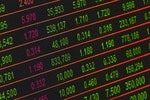
Will GoodRX Stock Bounce Back?
GoodRX (NASDAQ:GDRX) tracks prescription drug prices and its model was…


| Company | Revenue Forecast | Earnings Forecast | Revenue Growth Forecast | Earnings Growth Forecast | Analyst Price Target Median |
|---|---|---|---|---|---|
|
BHLB
Berkshire Hills Bancorp
|
$113.3M | $0.59 | 4.31% | 2.63% | $31.66 |
|
BRKL
Brookline Bancorp
|
$95.3M | $0.25 | 9.8% | 37.04% | $14.25 |
|
BUSE
First Busey
|
$193.4M | $0.62 | 67.89% | 15.33% | $27.00 |
|
BYFC
Broadway Financial
|
-- | -- | -- | -- | -- |
|
CARV
Carver Bancorp
|
-- | -- | -- | -- | -- |
|
CASH
Pathward Financial
|
$185.1M | $1.67 | 31.78% | 1.41% | $88.00 |
| Company | Price | Analyst Target | Market Cap | P/E Ratio | Dividend per Share | Dividend Yield | Price / LTM Sales |
|---|---|---|---|---|---|---|---|
|
BHLB
Berkshire Hills Bancorp
|
$26.14 | $31.66 | $1.2B | 10.58x | $0.18 | 3.44% | 2.59x |
|
BRKL
Brookline Bancorp
|
$10.95 | $14.25 | $975.7M | 13.35x | $0.14 | 4.93% | 2.73x |
|
BUSE
First Busey
|
$24.11 | $27.00 | $2.2B | 22.56x | $0.25 | 4.07% | 3.07x |
|
BYFC
Broadway Financial
|
$8.16 | -- | $75.3M | 173.00x | $0.00 | 0% | 2.09x |
|
CARV
Carver Bancorp
|
$1.90 | -- | $9.6M | -- | $0.00 | 0% | 0.44x |
|
CASH
Pathward Financial
|
$81.54 | $88.00 | $1.9B | 11.00x | $0.05 | 0.25% | 3.23x |
| Company | Total Debt / Total Capital | Beta | Debt to Equity | Quick Ratio |
|---|---|---|---|---|
|
BHLB
Berkshire Hills Bancorp
|
36.39% | 1.154 | 56.58% | 3.50x |
|
BRKL
Brookline Bancorp
|
48.24% | 0.970 | 119.01% | 1.06x |
|
BUSE
First Busey
|
15.34% | 1.575 | 20.31% | 8.66x |
|
BYFC
Broadway Financial
|
21.43% | 1.239 | 36.04% | 2.57x |
|
CARV
Carver Bancorp
|
40.63% | 2.064 | 69.95% | -- |
|
CASH
Pathward Financial
|
3.86% | 1.082 | 1.94% | 5.53x |
| Company | Gross Profit | Operating Income | Return on Invested Capital | Return on Common Equity | EBIT Margin | Free Cash Flow |
|---|---|---|---|---|---|---|
|
BHLB
Berkshire Hills Bancorp
|
-- | -- | 6.25% | 9.8% | 84.33% | $19.9M |
|
BRKL
Brookline Bancorp
|
-- | -- | 2.8% | 6.01% | 102.08% | $8M |
|
BUSE
First Busey
|
-- | -- | 3.13% | 3.79% | 24.34% | $6.5M |
|
BYFC
Broadway Financial
|
-- | -- | 0.31% | 0.58% | 68.63% | $6.1M |
|
CARV
Carver Bancorp
|
-- | -- | -18.3% | -37.37% | -1.1% | -$6.2M |
|
CASH
Pathward Financial
|
-- | -- | 20% | 22.91% | 44.06% | -$131.5M |
Brookline Bancorp has a net margin of 23.29% compared to Berkshire Hills Bancorp's net margin of 20.88%. Berkshire Hills Bancorp's return on equity of 9.8% beat Brookline Bancorp's return on equity of 6.01%.
| Company | Gross Margin | Earnings Per Share | Invested Capital |
|---|---|---|---|
|
BHLB
Berkshire Hills Bancorp
|
-- | $0.56 | $1.9B |
|
BRKL
Brookline Bancorp
|
-- | $0.21 | $2.4B |
Berkshire Hills Bancorp has a consensus price target of $31.66, signalling upside risk potential of 21.11%. On the other hand Brookline Bancorp has an analysts' consensus of $14.25 which suggests that it could grow by 30.14%. Given that Brookline Bancorp has higher upside potential than Berkshire Hills Bancorp, analysts believe Brookline Bancorp is more attractive than Berkshire Hills Bancorp.
| Company | Buy Ratings | Hold Ratings | Sell Ratings |
|---|---|---|---|
|
BHLB
Berkshire Hills Bancorp
|
2 | 3 | 0 |
|
BRKL
Brookline Bancorp
|
2 | 1 | 0 |
Berkshire Hills Bancorp has a beta of 0.615, which suggesting that the stock is 38.546% less volatile than S&P 500. In comparison Brookline Bancorp has a beta of 0.887, suggesting its less volatile than the S&P 500 by 11.316%.
Berkshire Hills Bancorp has a quarterly dividend of $0.18 per share corresponding to a yield of 3.44%. Brookline Bancorp offers a yield of 4.93% to investors and pays a quarterly dividend of $0.14 per share. Berkshire Hills Bancorp pays 50.72% of its earnings as a dividend. Brookline Bancorp pays out 69.94% of its earnings as a dividend. Both of these payout ratios are sufficient to cover dividend payouts with earnings for the foreseeable future.
Berkshire Hills Bancorp quarterly revenues are $110.4M, which are larger than Brookline Bancorp quarterly revenues of $91.5M. Berkshire Hills Bancorp's net income of $25.7M is higher than Brookline Bancorp's net income of $19.1M. Notably, Berkshire Hills Bancorp's price-to-earnings ratio is 10.58x while Brookline Bancorp's PE ratio is 13.35x. Generally a lower price-to-earnings ratio signals a stock is trading at a lower multiple of earnings and is a better value. Another key metric is the price-to-sales ratio, which for Berkshire Hills Bancorp is 2.59x versus 2.73x for Brookline Bancorp. Usually stocks with elevated PS ratios are considered overvalued.
| Company | Price/Sales Ratio | Price/Earnings Ratio | Quarterly Revenue | Quarterly Net Income |
|---|---|---|---|---|
|
BHLB
Berkshire Hills Bancorp
|
2.59x | 10.58x | $110.4M | $25.7M |
|
BRKL
Brookline Bancorp
|
2.73x | 13.35x | $91.5M | $19.1M |
First Busey has a net margin of 23.29% compared to Berkshire Hills Bancorp's net margin of -24%. Berkshire Hills Bancorp's return on equity of 9.8% beat First Busey's return on equity of 3.79%.
| Company | Gross Margin | Earnings Per Share | Invested Capital |
|---|---|---|---|
|
BHLB
Berkshire Hills Bancorp
|
-- | $0.56 | $1.9B |
|
BUSE
First Busey
|
-- | -$0.44 | $2.6B |
Berkshire Hills Bancorp has a consensus price target of $31.66, signalling upside risk potential of 21.11%. On the other hand First Busey has an analysts' consensus of $27.00 which suggests that it could grow by 11.99%. Given that Berkshire Hills Bancorp has higher upside potential than First Busey, analysts believe Berkshire Hills Bancorp is more attractive than First Busey.
| Company | Buy Ratings | Hold Ratings | Sell Ratings |
|---|---|---|---|
|
BHLB
Berkshire Hills Bancorp
|
2 | 3 | 0 |
|
BUSE
First Busey
|
1 | 3 | 0 |
Berkshire Hills Bancorp has a beta of 0.615, which suggesting that the stock is 38.546% less volatile than S&P 500. In comparison First Busey has a beta of 0.775, suggesting its less volatile than the S&P 500 by 22.516%.
Berkshire Hills Bancorp has a quarterly dividend of $0.18 per share corresponding to a yield of 3.44%. First Busey offers a yield of 4.07% to investors and pays a quarterly dividend of $0.25 per share. Berkshire Hills Bancorp pays 50.72% of its earnings as a dividend. First Busey pays out 47.65% of its earnings as a dividend. Both of these payout ratios are sufficient to cover dividend payouts with earnings for the foreseeable future.
Berkshire Hills Bancorp quarterly revenues are $110.4M, which are smaller than First Busey quarterly revenues of $125M. Berkshire Hills Bancorp's net income of $25.7M is higher than First Busey's net income of -$30M. Notably, Berkshire Hills Bancorp's price-to-earnings ratio is 10.58x while First Busey's PE ratio is 22.56x. Generally a lower price-to-earnings ratio signals a stock is trading at a lower multiple of earnings and is a better value. Another key metric is the price-to-sales ratio, which for Berkshire Hills Bancorp is 2.59x versus 3.07x for First Busey. Usually stocks with elevated PS ratios are considered overvalued.
| Company | Price/Sales Ratio | Price/Earnings Ratio | Quarterly Revenue | Quarterly Net Income |
|---|---|---|---|---|
|
BHLB
Berkshire Hills Bancorp
|
2.59x | 10.58x | $110.4M | $25.7M |
|
BUSE
First Busey
|
3.07x | 22.56x | $125M | -$30M |
Broadway Financial has a net margin of 23.29% compared to Berkshire Hills Bancorp's net margin of -5.41%. Berkshire Hills Bancorp's return on equity of 9.8% beat Broadway Financial's return on equity of 0.58%.
| Company | Gross Margin | Earnings Per Share | Invested Capital |
|---|---|---|---|
|
BHLB
Berkshire Hills Bancorp
|
-- | $0.56 | $1.9B |
|
BYFC
Broadway Financial
|
-- | -$0.14 | $364.2M |
Berkshire Hills Bancorp has a consensus price target of $31.66, signalling upside risk potential of 21.11%. On the other hand Broadway Financial has an analysts' consensus of -- which suggests that it could fall by --. Given that Berkshire Hills Bancorp has higher upside potential than Broadway Financial, analysts believe Berkshire Hills Bancorp is more attractive than Broadway Financial.
| Company | Buy Ratings | Hold Ratings | Sell Ratings |
|---|---|---|---|
|
BHLB
Berkshire Hills Bancorp
|
2 | 3 | 0 |
|
BYFC
Broadway Financial
|
0 | 0 | 0 |
Berkshire Hills Bancorp has a beta of 0.615, which suggesting that the stock is 38.546% less volatile than S&P 500. In comparison Broadway Financial has a beta of 0.726, suggesting its less volatile than the S&P 500 by 27.353%.
Berkshire Hills Bancorp has a quarterly dividend of $0.18 per share corresponding to a yield of 3.44%. Broadway Financial offers a yield of 0% to investors and pays a quarterly dividend of $0.00 per share. Berkshire Hills Bancorp pays 50.72% of its earnings as a dividend. Broadway Financial pays out 81.36% of its earnings as a dividend. Both of these payout ratios are sufficient to cover dividend payouts with earnings for the foreseeable future.
Berkshire Hills Bancorp quarterly revenues are $110.4M, which are larger than Broadway Financial quarterly revenues of $8.3M. Berkshire Hills Bancorp's net income of $25.7M is higher than Broadway Financial's net income of -$451K. Notably, Berkshire Hills Bancorp's price-to-earnings ratio is 10.58x while Broadway Financial's PE ratio is 173.00x. Generally a lower price-to-earnings ratio signals a stock is trading at a lower multiple of earnings and is a better value. Another key metric is the price-to-sales ratio, which for Berkshire Hills Bancorp is 2.59x versus 2.09x for Broadway Financial. Usually stocks with elevated PS ratios are considered overvalued.
| Company | Price/Sales Ratio | Price/Earnings Ratio | Quarterly Revenue | Quarterly Net Income |
|---|---|---|---|---|
|
BHLB
Berkshire Hills Bancorp
|
2.59x | 10.58x | $110.4M | $25.7M |
|
BYFC
Broadway Financial
|
2.09x | 173.00x | $8.3M | -$451K |
Carver Bancorp has a net margin of 23.29% compared to Berkshire Hills Bancorp's net margin of -64.55%. Berkshire Hills Bancorp's return on equity of 9.8% beat Carver Bancorp's return on equity of -37.37%.
| Company | Gross Margin | Earnings Per Share | Invested Capital |
|---|---|---|---|
|
BHLB
Berkshire Hills Bancorp
|
-- | $0.56 | $1.9B |
|
CARV
Carver Bancorp
|
-- | -$0.72 | $49.8M |
Berkshire Hills Bancorp has a consensus price target of $31.66, signalling upside risk potential of 21.11%. On the other hand Carver Bancorp has an analysts' consensus of -- which suggests that it could grow by 16204.34%. Given that Carver Bancorp has higher upside potential than Berkshire Hills Bancorp, analysts believe Carver Bancorp is more attractive than Berkshire Hills Bancorp.
| Company | Buy Ratings | Hold Ratings | Sell Ratings |
|---|---|---|---|
|
BHLB
Berkshire Hills Bancorp
|
2 | 3 | 0 |
|
CARV
Carver Bancorp
|
0 | 0 | 0 |
Berkshire Hills Bancorp has a beta of 0.615, which suggesting that the stock is 38.546% less volatile than S&P 500. In comparison Carver Bancorp has a beta of 1.215, suggesting its more volatile than the S&P 500 by 21.491%.
Berkshire Hills Bancorp has a quarterly dividend of $0.18 per share corresponding to a yield of 3.44%. Carver Bancorp offers a yield of 0% to investors and pays a quarterly dividend of $0.00 per share. Berkshire Hills Bancorp pays 50.72% of its earnings as a dividend. Carver Bancorp pays out -- of its earnings as a dividend. Berkshire Hills Bancorp's payout ratio is sufficient to cover dividend payouts with earnings for the foreseeable future.
Berkshire Hills Bancorp quarterly revenues are $110.4M, which are larger than Carver Bancorp quarterly revenues of $5.8M. Berkshire Hills Bancorp's net income of $25.7M is higher than Carver Bancorp's net income of -$3.8M. Notably, Berkshire Hills Bancorp's price-to-earnings ratio is 10.58x while Carver Bancorp's PE ratio is --. Generally a lower price-to-earnings ratio signals a stock is trading at a lower multiple of earnings and is a better value. Another key metric is the price-to-sales ratio, which for Berkshire Hills Bancorp is 2.59x versus 0.44x for Carver Bancorp. Usually stocks with elevated PS ratios are considered overvalued.
| Company | Price/Sales Ratio | Price/Earnings Ratio | Quarterly Revenue | Quarterly Net Income |
|---|---|---|---|---|
|
BHLB
Berkshire Hills Bancorp
|
2.59x | 10.58x | $110.4M | $25.7M |
|
CARV
Carver Bancorp
|
0.44x | -- | $5.8M | -$3.8M |
Pathward Financial has a net margin of 23.29% compared to Berkshire Hills Bancorp's net margin of 34.03%. Berkshire Hills Bancorp's return on equity of 9.8% beat Pathward Financial's return on equity of 22.91%.
| Company | Gross Margin | Earnings Per Share | Invested Capital |
|---|---|---|---|
|
BHLB
Berkshire Hills Bancorp
|
-- | $0.56 | $1.9B |
|
CASH
Pathward Financial
|
-- | $3.11 | $865.6M |
Berkshire Hills Bancorp has a consensus price target of $31.66, signalling upside risk potential of 21.11%. On the other hand Pathward Financial has an analysts' consensus of $88.00 which suggests that it could grow by 7.92%. Given that Berkshire Hills Bancorp has higher upside potential than Pathward Financial, analysts believe Berkshire Hills Bancorp is more attractive than Pathward Financial.
| Company | Buy Ratings | Hold Ratings | Sell Ratings |
|---|---|---|---|
|
BHLB
Berkshire Hills Bancorp
|
2 | 3 | 0 |
|
CASH
Pathward Financial
|
0 | 2 | 0 |
Berkshire Hills Bancorp has a beta of 0.615, which suggesting that the stock is 38.546% less volatile than S&P 500. In comparison Pathward Financial has a beta of 0.617, suggesting its less volatile than the S&P 500 by 38.291%.
Berkshire Hills Bancorp has a quarterly dividend of $0.18 per share corresponding to a yield of 3.44%. Pathward Financial offers a yield of 0.25% to investors and pays a quarterly dividend of $0.05 per share. Berkshire Hills Bancorp pays 50.72% of its earnings as a dividend. Pathward Financial pays out 3.01% of its earnings as a dividend. Both of these payout ratios are sufficient to cover dividend payouts with earnings for the foreseeable future.
Berkshire Hills Bancorp quarterly revenues are $110.4M, which are smaller than Pathward Financial quarterly revenues of $218.2M. Berkshire Hills Bancorp's net income of $25.7M is lower than Pathward Financial's net income of $74.3M. Notably, Berkshire Hills Bancorp's price-to-earnings ratio is 10.58x while Pathward Financial's PE ratio is 11.00x. Generally a lower price-to-earnings ratio signals a stock is trading at a lower multiple of earnings and is a better value. Another key metric is the price-to-sales ratio, which for Berkshire Hills Bancorp is 2.59x versus 3.23x for Pathward Financial. Usually stocks with elevated PS ratios are considered overvalued.
| Company | Price/Sales Ratio | Price/Earnings Ratio | Quarterly Revenue | Quarterly Net Income |
|---|---|---|---|---|
|
BHLB
Berkshire Hills Bancorp
|
2.59x | 10.58x | $110.4M | $25.7M |
|
CASH
Pathward Financial
|
3.23x | 11.00x | $218.2M | $74.3M |
Signup to receive the latest stock alerts


GoodRX (NASDAQ:GDRX) tracks prescription drug prices and its model was…

Freeport-McMoRan (NYSE:FCX) is among the world’s largest producers of copper…

Levi Strauss (NYSE:LEVI) is among the oldest clothing brands in…
Market Cap: $4.2T
P/E Ratio: 58x
Market Cap: $3.8T
P/E Ratio: 43x
Market Cap: $3.1T
P/E Ratio: 35x
SharpLink Gaming [SBET] is down 2.6% over the past day.
Exodus Movement [EXOD] is down 4.14% over the past day.
Unity Software [U] is up 7.51% over the past day.

